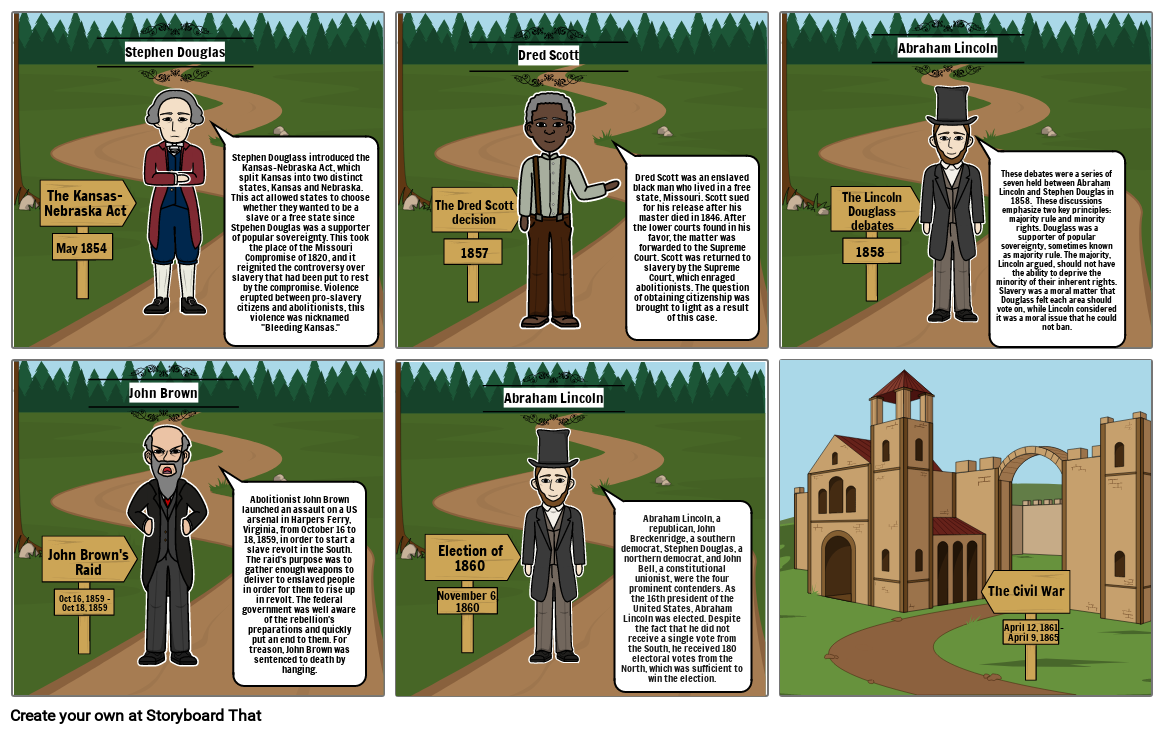Unknown Story

Süžeeskeem Tekst
- May 1854
- The Kansas–Nebraska Act
- Stephen Douglas
- Stephen Douglass introduced the Kansas-Nebraska Act, which split Kansas into two distinct states, Kansas and Nebraska. This act allowed states to choose whether they wanted to be a slave or a free state since Stpehen Douglas was a supporter of popular sovereignty. This took the place of the Missouri Compromise of 1820, and it reignited the controversy over slavery that had been put to rest by the compromise. Violence erupted between pro-slavery citizens and abolitionists, this violence was nicknamed  "Bleeding Kansas."
- 1857
- The Dred Scott decision
- Dred Scott
- Dred Scott was an enslaved black man who lived in a free state, Missouri. Scott sued for his release after his master died in 1846. After the lower courts found in his favor, the matter was forwarded to the Supreme Court. Scott was returned to slavery by the Supreme Court, which enraged abolitionists. The question of obtaining citizenship was brought to light as a result of this case.
- 1858
- The Lincoln Douglass debates
- Abraham Lincoln
- These debates were a series of seven held between Abraham Lincoln and Stephen Douglas in 1858.  These discussions emphasize two key principles: majority rule and minority rights. Douglass was a supporter of popular sovereignty, sometimes known as majority rule. The majority, Lincoln argued, should not have the ability to deprive the minority of their inherent rights. Slavery was a moral matter that Douglass felt each area should vote on, while Lincoln considered it was a moral issue that he could not ban.
- Oct 16, 1859 – Oct 18, 1859
- John Brown's Raid
- John Brown
- Abolitionist John Brown launched an assault on a US arsenal in Harpers Ferry, Virginia, from October 16 to 18, 1859, in order to start a slave revolt in the South. The raid's purpose was to gather enough weapons to deliver to enslaved people in order for them to rise up in revolt. The federal government was well aware of the rebellion's preparations and quickly put an end to them. For treason, John Brown was sentenced to death by hanging.
- November 6, 1860
- Election of 1860
- Abraham Lincoln
- Abraham Lincoln, a republican, John Breckenridge, a southern democrat, Stephen Douglas, a northern democrat, and John Bell, a constitutional unionist, were the four prominent contenders. As the 16th president of the United States, Abraham Lincoln was elected. Despite the fact that he did not receive a single vote from the South, he received 180 electoral votes from the North, which was sufficient to win the election.
- The Civil War
- The Civil War
- April 12, 1861 – April 9, 1865
Loodud üle 30 miljoni süžeeskeemi

